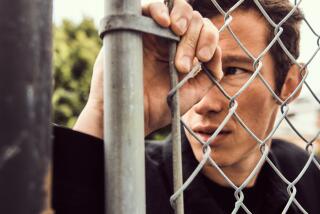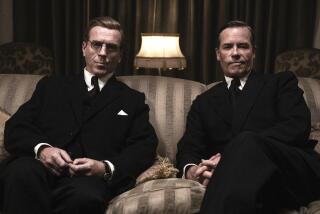Dimbleby of the BBC, on U.K./U.S. Ties
- Share via
Until he died in 1965 at the age of 52, the “official” voice of Britain to millions there and around the world was the BBC’s chief correspondent and commentator, a man with the splendid Dickensian name of Richard Dimbleby.
No coronation, no royal wedding or anniversary was quite complete unless it was narrated by the mellifluous and endlessly well-informed Dimbleby voice.
Once, his son David Dimbleby remembered during a visit to Los Angeles this week, his father was on hand to describe the opening by the queen mother of an exhibition of needlework. The appointed hour arrived and the queen mother did not. Dimbleby recited everything he knew or had ever heard, thought or felt about needlework. (“He always did his homework,” David Dimbleby said.)
The queen mother finally appeared, 20 minutes late, with profuse apologies for Dimbleby. “My dear Mr. Dimbleby,” she said, “I’m so sorry to be late, but I couldn’t stop listening to all those fascinating things you were saying about needlework.”
David Dimbleby has extended the family’s tradition. He is said to be not the second but the fifth generation of Dimbleby journalists. He joined the BBC right out of Oxford in 1961 and has been compared to Walter Cronkite, although Tom Brokaw might be a more apt link.
Dimbleby, 50 this year, has been a program host and interviewer and a documentary maker whose travels have taken him to Borneo and, often, to this country, where he has reported on the Ku Klux Klan. This year he will again be in Washington, anchoring the BBC’s coverage of the presidential election in November.
“I joined the BBC out of love rather than out of a great family tie,” Dimbleby says. “I ran into debt at Oxford, in the way of all young men there. I was much in love with a young woman, and there had been Champagne and all that. Her father said I could marry her but only if I was back in credit. There were very few ways for a young man to earn significant money quickly in those days, and television was one of them.”
He joined the BBC as a radio and television reporter and was soon enough solvent again, but the girl jilted him anyway. The career has lasted, and Dimbleby’s wife Josceline writes best-selling cookbooks.
Dimbleby, who a decade ago did a much-honored series on South Africa’s Afrikaners called “The White Tribe of Africa,” has now written and hosted a very impressive seven-part series, “An Ocean Apart,” a history of the close, curious and often contradictory relations between Britain and the United States in the 20th Century.
The series has its debut Monday on KCET-TV Channel 28 at 9 p.m. The Los Angeles station co-produced the series in association with WNET-TV in New York and the BBC itself.
The first episode, “Hats Off to Mr. Wilson” (from a music hall song), takes World War I as the point of passage, with the fact and the responsibilities of world power moving from the British Empire to its former colony, marked by the American presence in the war.
The series’ film researchers have come up with some vivid and relatively unfamiliar newsreel footages, from archives here and in Britain. The first American troops, seen from a rooftop angle, march through London in broad columns.
The carnage of trench warfare, seen again, reminds you not least of the fearless cameramen who cranked away amid the machine-gun fire and the shrapnel. This coverage, too, looks relatively unfamiliar and is newly sobering.
There is a good deal on President Woodrow Wilson himself, arriving in Paris and waving his top hat as he rides in open carriage with French Premier Georges Clemenceau. “The National Film Archive in Washington was a gold mine,” Dimbleby says.
That war is now 70 or more years distant, yet there are some affecting current interviews, including one with A. J. Sylvester, who was secretary to Prime Minister David Lloyd-George and who at 98 remembers it all clearly--and in a booming voice. (“He’s gone a bit hard of hearing and I was hoarse for three days afterward from shouting,” Dimbleby says.)
There’s another interview with a man recalling his father going off to the war, and recalling as well his first sight as a child of Yankee troops playing baseball.
In collaboration with historian David Reynolds of Christ’s College, Cambridge, Dimbleby has written a book on the series theme (“An Ocean Apart,” Random House, $24.95). But it was done, at his insistence, in preparation for the series rather than drawn from it.
The series was three years in the making, delayed once when the money ran short and again when Dimbleby was on a short list to be director-general of the BBC, and the inquiries were time consuming. (He didn’t make it, but he’s young yet.)
As it is, the series is down to the wire. “I wrote the camera copy for the last episode last week and I record it later this week,” Dimbleby said. “Meanwhile, the fourth episode is just on in Britain.”
The Reykjavik summit is the end-point of the series, suggesting that the U.K.-U.S. relationship is probably at yet another juncture. The philosophically close partnership of Ronald Reagan and Margaret Thatcher will end in November or January, and the U.S. gaze seems to be shifting from England and Europe to the Pacific Rim.
The Cold War, which drew the U.S. and Britain close together against the chill, appears to be thawing with consequences not yet fully evident. And the U.S., now a debtor nation, stands as a rather beleaguered world power, her position perhaps not totally unlike Britain’s two wars ago.
Britain, as Dimbleby and Reynolds note in the book, lost one sixth of her wealth in the ‘14-’18 War and a quarter of what remained in World War II.
“The decline of Britain,” Dimbleby and Reynolds say, “has been as swift as the rise of the United States to occupy the position Britain once held.”
Winston Churchill once described himself as “half American and wholly British,” bespeaking not only his own genealogy but a special affection that has linked the countries and, Dimbleby says, will continue to. “The bonds of history, culture and language are too strong for it to be otherwise.”
But the U.S., he says, looks anxiously across the Pacific, and Britain looks with historical mistrust at closer ties to Europe. It is a changed day. For Britons, the book concludes, the Atlantic “often seems narrower and less forbidding than the English Channel.”
Many an American might say the same.
More to Read
Sign up for Essential California
The most important California stories and recommendations in your inbox every morning.
You may occasionally receive promotional content from the Los Angeles Times.













